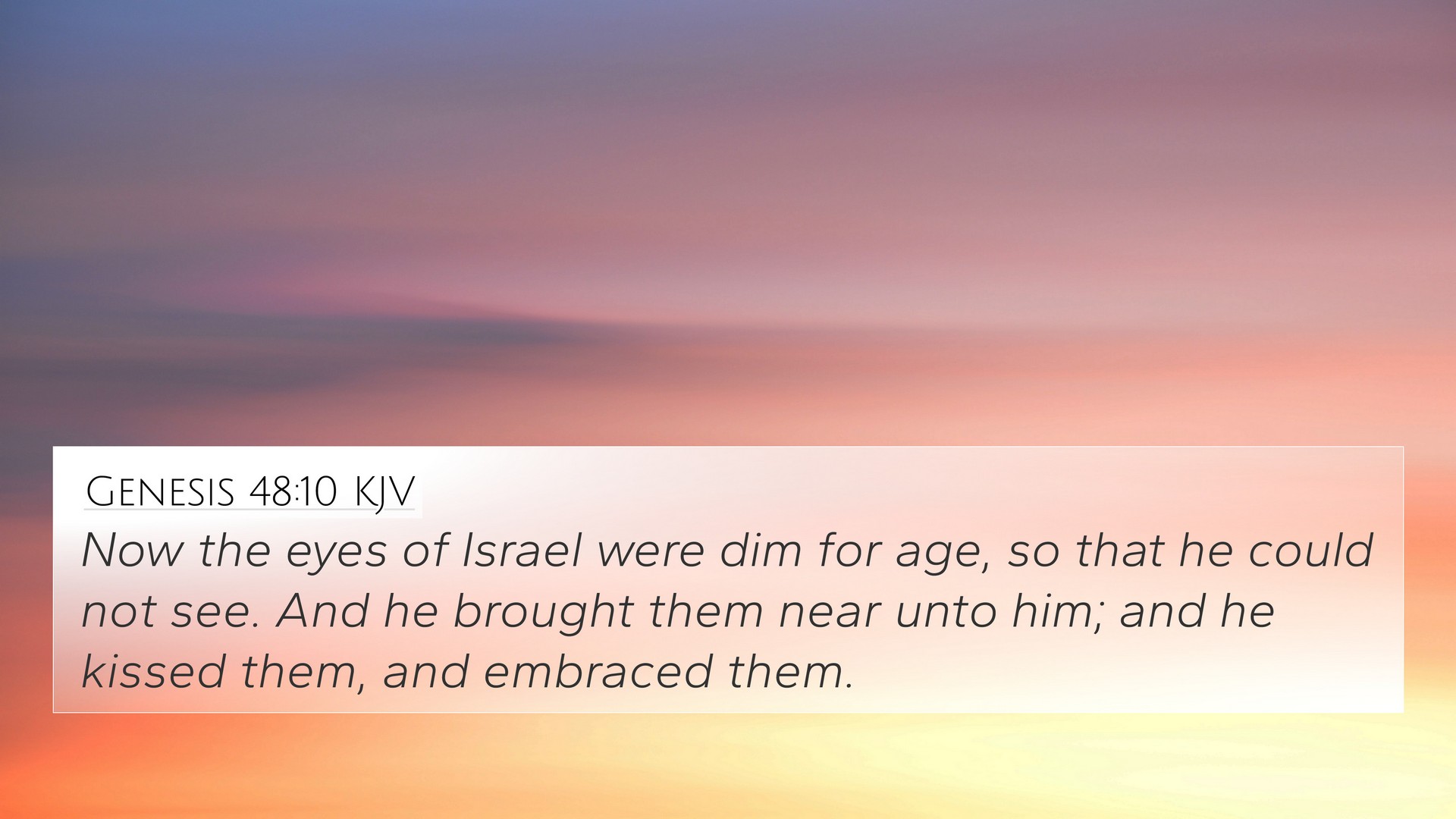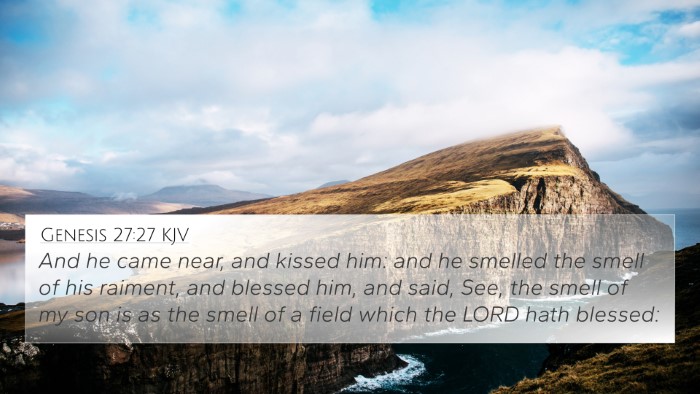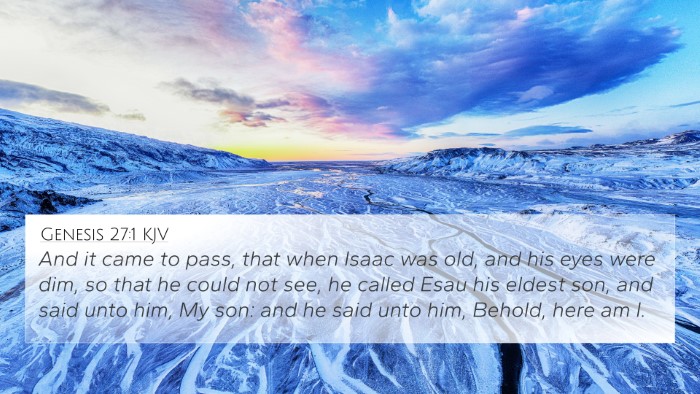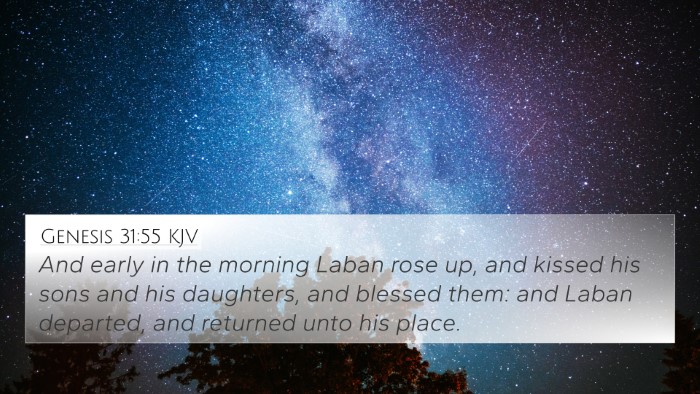Understanding Genesis 48:10
Genesis 48:10 states: "Now the eyes of Israel were dim for age, so that he could not see. And he brought them near unto him; and he kissed them, and embraced them." This verse encapsulates a significant moment in Jacob's life as he blesses the sons of Joseph, Ephraim and Manasseh. The dimness of Jacob's eyes symbolizes his old age and approaching death, yet it does not hinder the heartfelt blessing he bestows upon his grandchildren.
Summary of Insights from Public Domain Commentaries
Matthew Henry's Commentary
Matthew Henry emphasizes the tender emotions Jacob experiences, even in his frailty. He notes that Jacob's love for Joseph is manifested through his affection for Joseph's sons. The act of kissing and embracing highlights the connection between generations and the passing down of blessings. Henry points out that Jacob's eyesight may be dim, but his spiritual perception and understanding remain clear as he recognizes God's plan and chooses to bless the younger over the elder.
Albert Barnes' Notes
Albert Barnes elaborates on the idea that Jacob's impaired vision does not prevent him from executing God’s will. He indicates that Jacob's inability to see well physically contrasts with his insightful spiritual vision. Barnes also highlights that this moment is crucial as it symbolizes the transition of the covenant blessings, showing that God’s purpose often contravenes human expectations, as seen in the blessing of Ephraim over Manasseh.
Adam Clarke's Commentary
Adam Clarke underscores the significance of the embrace and kiss, seeing it as a manifestation of love and acceptance. He also makes note of the cultural implications of lineage and blessing during this pivotal scene. Clarke discusses the importance of the blessing itself and how it serves as a prophetic declaration over the future of the two tribes that will arise from these sons. He also reflects on Jacob's reliance on God's promises, stating that even in weakness, he affirms his faith in God’s plan.
Cross-References for Genesis 48:10
- Genesis 27:28-29 - Jacob's blessing of Esau and the significance of blessings in family.
- Genesis 39:3 - God's favor on Joseph as a foreshadowing of the blessings on Ephraim and Manasseh.
- Exodus 12:21-27 - The importance of passing legacy and traditions through generations.
- Matthew 19:13-15 - Jesus blesses the little children as a parallel to Jacob's blessing of grandsons.
- Hebrews 11:21 - Jacob’s faith demonstrated as he blesses his grandsons, indicating its importance in the Hall of Faith.
- Joshua 16:1-4 - The fulfillment of Jacob's prophecy to Ephraim and Manasseh as they receive their inheritance.
- Romans 9:12 - God's election and purpose demonstrated as seen in the preference of Ephraim over Manasseh.
Thematic Bible Verse Connections
Genesis 48:10 signifies more than just a family blessing; it reveals thematic connections across the Biblical narrative. The transition of blessings can be seen as a recurring motif where God’s choice often conflicts with human expectations. This theme recurs as we observe:
- The preference for Abel over Cain in Genesis 4.
- Jacob over Esau in Genesis 25:23.
- The choice of David over his brothers in 1 Samuel 16.
- God's calling of the disciples in the New Testament, where the last become first.
Conclusion
Genesis 48:10 is a moment of great emotional depth and theological richness. It serves as a reminder of how God orchestrates his plans through generations, emphasizing that spiritual vision triumphs over physical limitations. The blessings passed down from Jacob to Joseph's sons represent not just familial love, but also the continuation of God's covenant—a theme echoed throughout the Bible.
Using Cross-Referencing Tools
If you wish to delve deeper into the connections between Bible verses as illustrated in Genesis 48:10, consider utilizing Bible study tools such as a Bible concordance or a cross-reference Bible study guide. These resources can provide a structured approach to identify and explore the Bible verses that relate to each other, allowing for a comprehensive understanding of scriptural ties.











